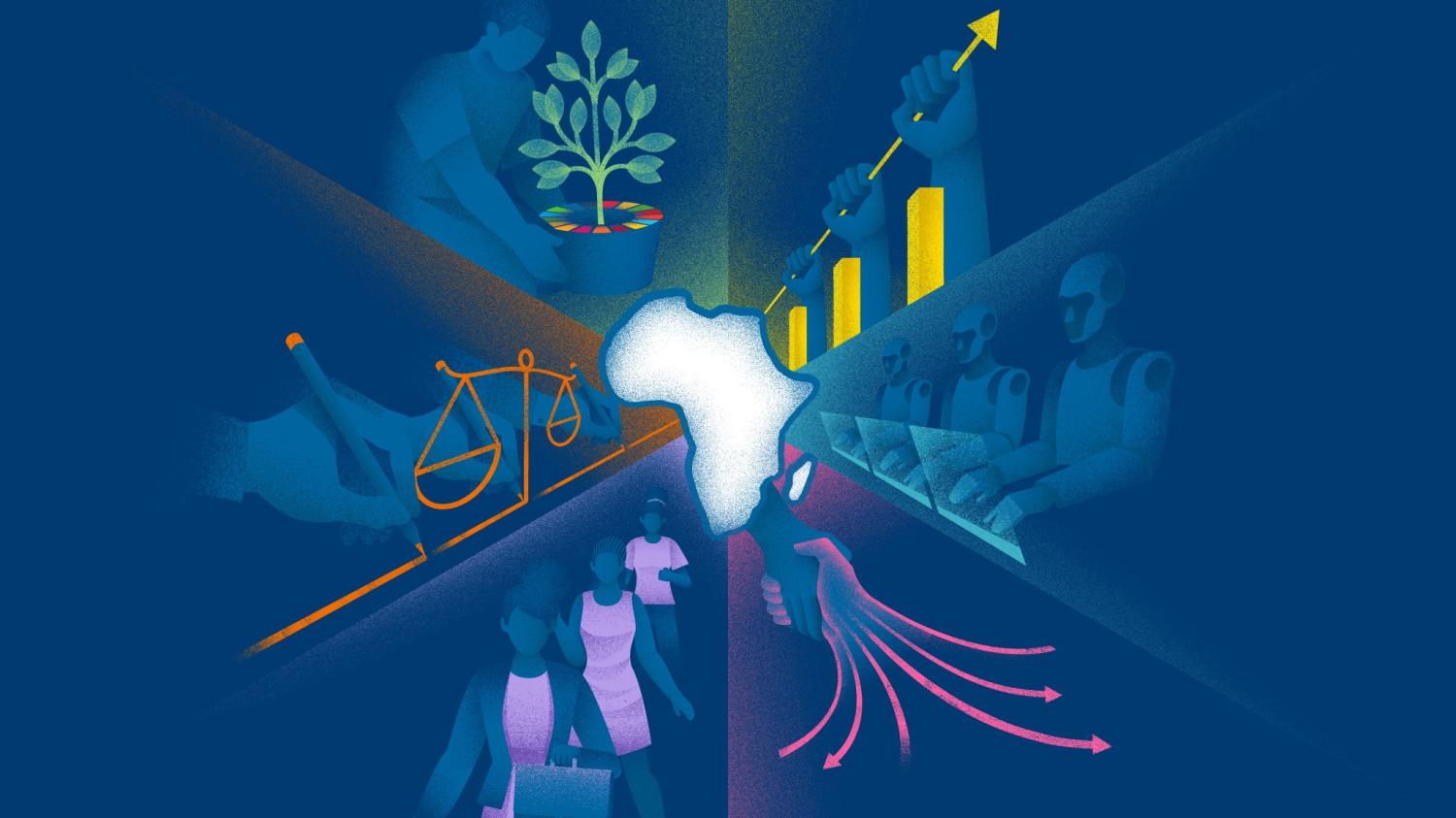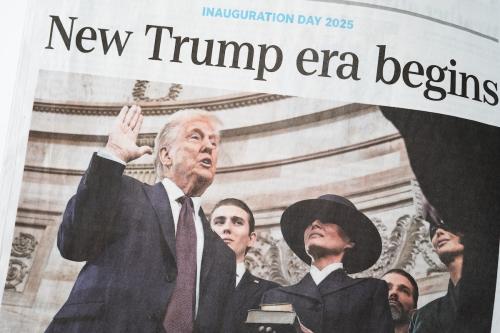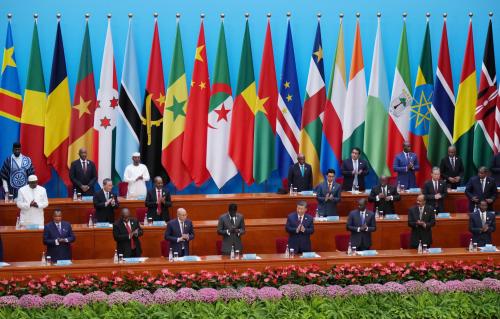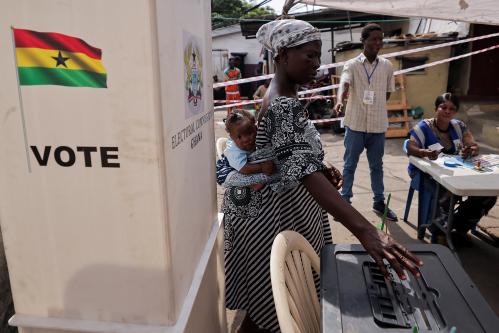This viewpoint is part of Chapter 6 of Foresight Africa 2025-2030, a report with cutting-edge insights and actionable strategies for Africa’s inclusive and sustainable development in the run-up to 2030. Read the full chapter on global partnerships.
By prioritizing economic empowerment and sustainability, we hope South Africa can set a precedent for future G20 meetings, ultimately reinforcing a narrative of hope, resilience, and collective action.
As South Africa chairs the first G20 meeting on African soil, we stand at a pivotal crossroads. The current global landscape, marked by multifaceted challenges—from crippling poverty and economic instability to the existential threat of climate change—demands a united front.1 South Africa’s presidency provides a unique opportunity for African voices to be heard and their ideas implemented. To achieve this, it is imperative that the continent aligns its priorities and provides innovative solutions to global challenges.
In his first address to the G20 as president, in November of last year, President Cyril Ramaphosa spoke on the need for collaboration between the public and private sectors across the globe, as these global challenges cannot be faced alone. Public-private partnerships are necessary in our interconnected world. They provide opportunities to improve upon research, innovation, and implementation across a vast array of sectors.2 Global interconnectedness, when leveraged properly, can lift all nations. South Africa has long emphasized the need for multilateralism.3 Strong multilateral institutions are better equipped to address global challenges than any one nation.4
In the spirit of exercising international cooperation to solve global issues, three new G20 task forces have been proposed by South Africa—focused on inclusive economic growth, food security, as well as artificial intelligence, data governance, and innovation for sustainable development.5 These three issues are integral to diminishing inequalities and protecting the world’s citizens while creating resiliency across economies. These three task forces will be entrusted with finding actionable initiatives that can foster sustainable development.
Brazil’s successful G20 presidency has served as an inspiration for South Africa’s leadership.6 As we reflect on the G20’s achievements over the past 20 years, this is our opportunity to repurpose past lessons into concrete strategies for the future. One such lesson is the need for improved resolutions to the burden of debt on economic growth.7 As a representative of the African continent, South Africa is acutely aware of the economic depression that has resulted from the enormous debt held by countries across the Global South.8 To address this concern, South Africa has proposed a Cost of Capital Commission to “deliver a comprehensive expert review on the issues impacting the cost of capital for developing economies which could help address future debt sustainability issues and related fiscal space challenges.”9
A substantial proportion of debt held by African countries, and those across the Global South more generally, is held by private institutions and multilateral organizations.10 For this reason, any proposed solution to the debt burden will require institutional reform to be successful.11 The economic shocks of the last five years continue to reverberate in African economies. COVID-19,12 increased insecurity,13 and inflation have left many African countries struggling to support their citizens.14 Institutional reform that incorporates the needs and concerns of those most affected by debt and including civil society groups, is necessary to address global inequalities effectively with the potential for long-term positive impact. In our G20 presidency, South Africa will seek to elevate marginalized voices through the G20 Social Forum and encourage these voices to be incorporated into any future policy decisions.
Finally, we see South Africa’s presidency as an opportunity to amplify the African Union’s Agenda 2063.15 As with Agenda 2063, the G20 must bring together diverse stakeholders—public officials, civil society groups, academics, private for-profit businesses, and citizens—to create institutional priorities and policies that benefit us all. By prioritizing economic empowerment and sustainability, we hope South Africa can set a precedent for future G20 meetings, ultimately reinforcing a narrative of hope, resilience, and collective action.
-
Acknowledgements and disclosures
We extend our gratitude to Nichole Grossman, Research Analyst at Brookings Africa Growth Initiative, for her outstanding research and editorial support.
-
Footnotes
- “Poverty: Overview,” World Bank, accessed December 16, 2024, https://www.worldbank.org/en/topic/poverty/overview; Indermit Gill and Ayhan Kose, “5 Major Risks Confronting the Global Economy in 2024,” Brookings Institution (blog), January 17, 2024, https://www.brookings.edu/articles/5-risks-global-economy-2024/; “Climate Change,” United Nations, accessed December 16, 2024, https://www.un.org/en/global-issues/climate-change.
- Nimesha Sahani Jayasena et al., “Applicability of Public-Private Partnerships in Smart Infrastructure Development: The Case of Hong Kong,” International Journal of Construction Management 23, no. 11 (August 18, 2023): 1932–44, https://doi.org/10.1080/15623599.2022.2027076; Stuart J. Smyth, Steven R. Webb, and Peter W.B. Phillips, “The Role of Public-Private Partnerships in Improving Global Food Security,” Global Food Security 31 (December 2021), https://doi.org/10.1016/j.gfs.2021.100588.
- Eduard Jordaan, “South Africa, Multilateralism and the Global Politics of Development,” The European Journal of Development Research 24 (February 23, 2012): 283–99, https://doi.org/10.1057/ejdr.2012.4.
- Cyril Ramaphosa, “Remarks by President Cyril Ramaphosa at the G20 Closing and Handover Ceremony of the G20 Leaders’ Summit, Rio De Janeiro, Brazil” (Rio de Janeiro, Brazil, November 19, 2024), https://www.thepresidency.gov.za/ remarks-president-cyril-ramaphosa-g20-closing-and-handover-ceremony-g20-leaders-summit-rio-de.
- “G20 Presidency to Establish Three Dedicated Task Forces – G20 South Africa,” G20, December 3, 2024, https://g20.org/news/g20-presidency-to-establish-three-dedicated-task-forces/.
- Hung Tran, “Brazil’s Approach to the G20: Leading by Example,” Atlantic Council (blog), April 12, 2024, https://www.atlanticcouncil.org/blogs/econographics/brazils-approach-to-the-g20-leading-by-example/.
- “South Africa: Managing Africas Debt Burden to Spur Development,” MENA Report, November 4, 2022, sec. Banking And Finance, https://www.proquest.com/docview/2732407417/citation/82488F56B8FE43E7PQ/1.
- “Africa’s Debt Burden Eroding Funds for Sustainable Development in LDCs,” AllAfrica.Com, December 23, 2024, https://www.proquest.com/docview/3148674257/citation/A3DBF5BCB134319PQ/1.
- “G20 Presidency,” G20 South Africa 2025, accessed January 7, 2025, https://g20.org/g20-south-africa/g20-presidency/.
- David McNair, “How South Africa Can Use Its G20 Presidency to Reduce the Cost of Developing Countries’ Debt,” Carnegie Endowment for International Peace (blog), December 13, 2024, https://carnegieendowment.org/ emissary/2024/12/debt-cost-of-capital-commission-south-africa-g20?lang=en.
- Ramaphosa, “Remarks by President Cyril Ramaphosa at the G20 Closing and Handover Ceremony of the G20 Leaders’ Summit, Rio De Janeiro, Brazil.”
- C. Anyanwu and Adeleke O. Salami, “The Impact of COVID‐19 on African Economies: An Introduction,” African Development Review 33, no. Suppl 1 (April 2021): S1–16, https://doi.org/10.1111/1467-8268.12531.
- John Adams Williams, Mabel Chioma Onyedinefu, and Ajala Ebenezer Olorunsogo, “The Impact of Insecurity on Socio-Economic Development in Nigeria,” Arts and Social Science Research 13, no. 2 (December 31, 2023): 223–46, https://fassjassr.com.ng/index.php/assr/article/view/115.
- Shelter Thelile Nene, Kehinde Damilola Ilesanmi, and Mashapa Sekome, “The Effect of Inflation Targeting (IT) Policy on the Inflation Uncertainty and Economic Growth in Selected African and European Countries,” Economies 10, no. 2 (February 2022): 37, https://doi.org/10.3390/economies10020037; Anh D.M. Nguyen et al., “On the Drivers of Inflation in sub-Saharan Africa,” International Economics 151 (October 2017): 71–84, https://doi.org/10.1016/j.inteco. 2017.04.002.
- Agenda 2063: The Africa We Want,” a African Union, ccessed December 10, 2024, https://au.int/en/agenda2063/overview.
The Brookings Institution is committed to quality, independence, and impact.
We are supported by a diverse array of funders. In line with our values and policies, each Brookings publication represents the sole views of its author(s).







Commentary
South Africa’s G20 presidency: A vital opportunity for global unity and sustainable progress
February 21, 2025